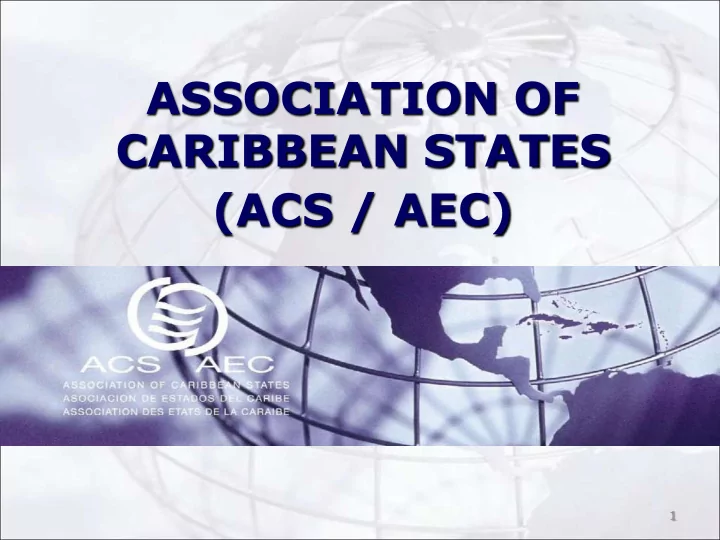

ASSOCIATION OF CARIBBEAN STATES (ACS / AEC) 1
SHOCS (Strengthening Hydrometorological Operations and Services in Caribbean SIDS) The ACS/Finnish Government response to Hydrometorological risk in Caribbean SIDS April 15 th 2016 4/21/2016 2
Background 2.6 US million dollar project financed by the Government of Finland and conceptualised by the Association of Caribbean States. SHOCS evolved from the SIDS Caribbean Project - Preparedness to Climate Variability and Global Change in Small Island Developing States, Caribbean Region Completed in two tranches (SHOCS I and SHOCS II) with a continuation phase COPS (complementary project to the SIDS- Caribbean Project and SHOCS I and II). The project strategy focused on several key areas of early warning systems in 16 beneficiary SIDS, including, but not limited to the installation and upgrading of meteorological equipment , the improvement of telecommunications systems , and staff training . 4/21/2016 3
Beneficiary Countries Antigua and Barbuda, Bahamas, Barbados, Belize, Cuba, Dominica, Dominican Republic, Grenada, Guyana, Haiti, Jamaica, St. Kitts and Nevis, St. Lucia, St. Vincent and the Grenadines, Suriname, and Trinidad and Tobago 4/21/2016 4
SHOCS I - Activities Completion of feasibility assessment on Caribbean SIDS • Improve capacity of the staff of National Meteorological and • Hydrological Services and Civil Protection agencies 4/21/2016 5
SHOCS I - Outcomes Recommendations made for the development of a Multi-Hazard • Early Warning System (MHEWS) for the Caribbean Identification of critical areas for capacity development: • – Strengthening political recognition and legislation for MHEWS and DRR – Strengthening institutional capacity of NMHS staff – Strengthening methods and technical resources to enhance hazard detection, monitoring and forecasting – Improving capacity for methods of delivery, visualisation and communicating of watches, warnings and advisories. 4/21/2016 6
SHOCS II - Activities Restoration of Automated Weather Stations in beneficiary countries • Implementation of tools for analysing, forecasting and preparing • service products Capacity building on institutional governance through quality • management Development and implementation of solutions for common presentation and communication of early warnings Enhancing presentation skills of early warning information to different sectors of society – Training on a TV broadcasting solution 4/21/2016 7
SHOCS II - Outcomes 9 SmartMet platforms installed in 8 participating countries. Antigua & Barbuda, Barbados (1 unit at the Meteorological Services and 1 unit at the CIMH), Belize, Cuba, Dominican Republic, Grenada, Guyana and Saint Lucia Meteorological Services. First advanced-level training workshop on SmartMet for forecasters and technicians held at FMI in Finland in June 2014 Installation of SmartAlert software (FMI-built) for issuing weather warnings in CAP-format to enhance communication of early warnings to various users. Test-piloted in Jamaica, Cuba and Antigua and Barbuda. Installation of a modern TV weather forecast presentation system was installed in Cuba in 2015. 4/21/2016 8
“Installation of SmartAlert software (FMI-built) for issuing weather warnings in CAP-format to enhance communication of early warnings to various users. Test-piloted in Jamaica, Cuba and Antigua and Barbuda.” This activity includes: Designing region wide harmonisation of alert information with • agreed colours and symbols which indicate the level of risk and hazard type associated Introduction and implementation of the CAP regionally • Planning and implementation of software to create web pages • showing weather alerts and warnings. 4/21/2016 9
Guiding Principles for successful MHEWS (Golnaraghi, 2012) Political recognition. • Common operational components. • Role clarification. • Resource allocation. • Risk assessment . • Appropriate warnings. • Timely dissemination. • Integration into response planning • Integration in relevant educational programmes. • 4/21/2016 10
Fostering Sustainability of Caribbean EWS How do we foster the appropriate institutional arrangements necessary for efficient and effective dissemination of hazard related warnings? As the region endeavours to integrate CAP, questions arise: Do EWS exist throughout the region? Are they effective? Are they equipped with full components? Which agency takes responsibility at the regional level for the protocols and standardisation of these systems? Are there additional CAP related standards that can be applied to the region? Who informs the region and applies these standards? 4/21/2016 11
Fostering Sustainability of Caribbean EWS How do we improve upon the collection, analysis and dissemination of data? Better inform other sectors e.g. tourism, agriculture in disaster preparedness and mitigation Are there plans to utilise this data to create an open access platform? Facilitate the development of an online and accessible platform which will allow NMHS and countries to exchange information and experiences 4/21/2016 12
Thank You nprescod@acs-aec.org 4/21/2016 13
Recommend
More recommend